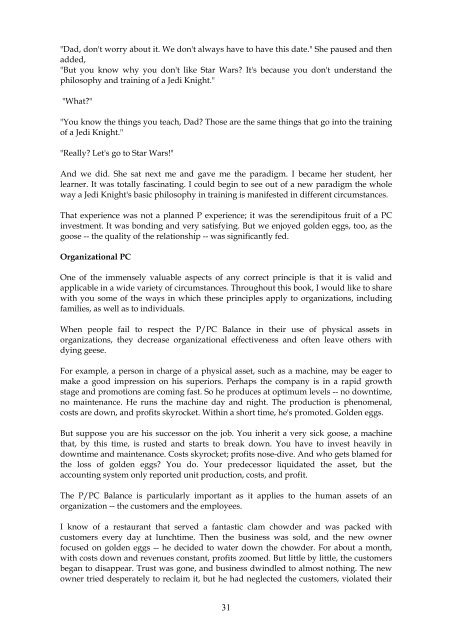Covey - The 7 habits of highly effective people
You also want an ePaper? Increase the reach of your titles
YUMPU automatically turns print PDFs into web optimized ePapers that Google loves.
"Dad, don't worry about it. We don't always have to have this date." She paused and then<br />
added,<br />
"But you know why you don't like Star Wars? It's because you don't understand the<br />
philosophy and training <strong>of</strong> a Jedi Knight."<br />
"What?"<br />
"You know the things you teach, Dad? Those are the same things that go into the training<br />
<strong>of</strong> a Jedi Knight."<br />
"Really? Let's go to Star Wars!"<br />
And we did. She sat next me and gave me the paradigm. I became her student, her<br />
learner. It was totally fascinating. I could begin to see out <strong>of</strong> a new paradigm the whole<br />
way a Jedi Knight's basic philosophy in training is manifested in different circumstances.<br />
That experience was not a planned P experience; it was the serendipitous fruit <strong>of</strong> a PC<br />
investment. It was bonding and very satisfying. But we enjoyed golden eggs, too, as the<br />
goose -- the quality <strong>of</strong> the relationship -- was significantly fed.<br />
Organizational PC<br />
One <strong>of</strong> the immensely valuable aspects <strong>of</strong> any correct principle is that it is valid and<br />
applicable in a wide variety <strong>of</strong> circumstances. Throughout this book, I would like to share<br />
with you some <strong>of</strong> the ways in which these principles apply to organizations, including<br />
families, as well as to individuals.<br />
When <strong>people</strong> fail to respect the P/PC Balance in their use <strong>of</strong> physical assets in<br />
organizations, they decrease organizational <strong>effective</strong>ness and <strong>of</strong>ten leave others with<br />
dying geese.<br />
For example, a person in charge <strong>of</strong> a physical asset, such as a machine, may be eager to<br />
make a good impression on his superiors. Perhaps the company is in a rapid growth<br />
stage and promotions are coming fast. So he produces at optimum levels -- no downtime,<br />
no maintenance. He runs the machine day and night. <strong>The</strong> production is phenomenal,<br />
costs are down, and pr<strong>of</strong>its skyrocket. Within a short time, he's promoted. Golden eggs.<br />
But suppose you are his successor on the job. You inherit a very sick goose, a machine<br />
that, by this time, is rusted and starts to break down. You have to invest heavily in<br />
downtime and maintenance. Costs skyrocket; pr<strong>of</strong>its nose-dive. And who gets blamed for<br />
the loss <strong>of</strong> golden eggs? You do. Your predecessor liquidated the asset, but the<br />
accounting system only reported unit production, costs, and pr<strong>of</strong>it.<br />
<strong>The</strong> P/PC Balance is particularly important as it applies to the human assets <strong>of</strong> an<br />
organization -- the customers and the employees.<br />
I know <strong>of</strong> a restaurant that served a fantastic clam chowder and was packed with<br />
customers every day at lunchtime. <strong>The</strong>n the business was sold, and the new owner<br />
focused on golden eggs -- he decided to water down the chowder. For about a month,<br />
with costs down and revenues constant, pr<strong>of</strong>its zoomed. But little by little, the customers<br />
began to disappear. Trust was gone, and business dwindled to almost nothing. <strong>The</strong> new<br />
owner tried desperately to reclaim it, but he had neglected the customers, violated their<br />
31


